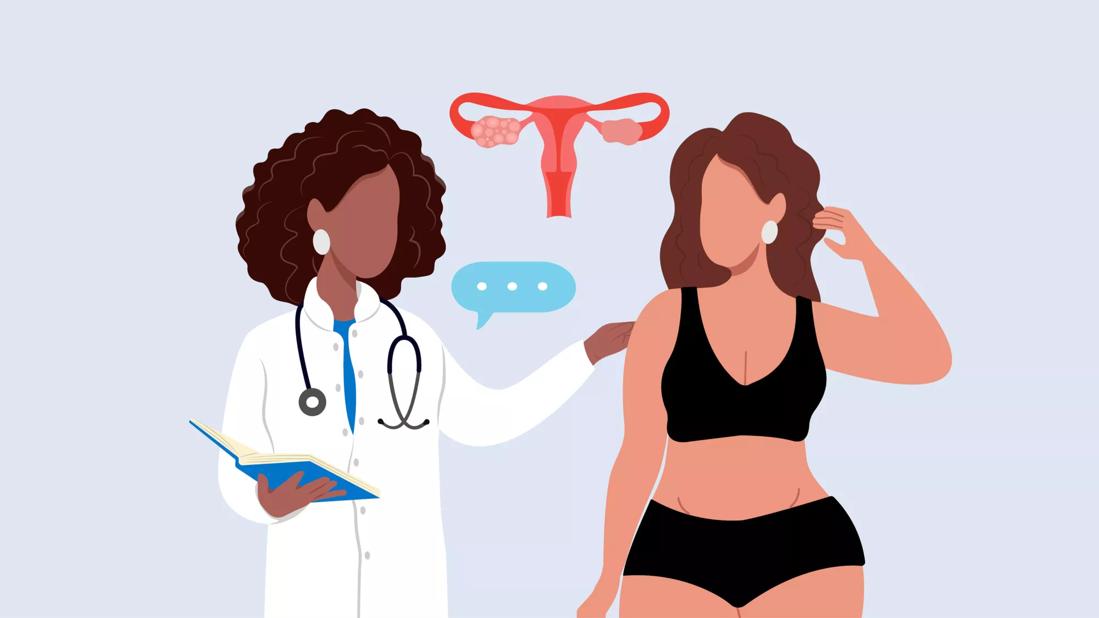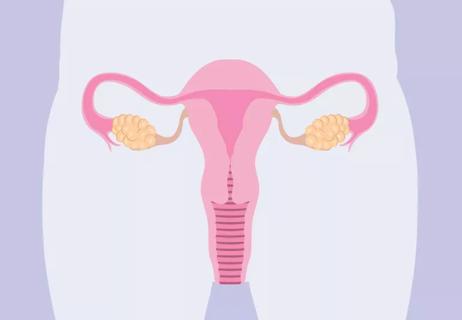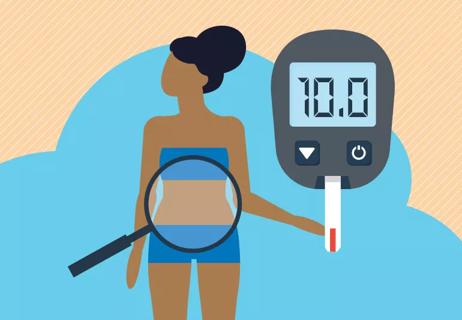The common hormonal condition is linked to insulin resistance, which can cause weight gain

Most conversations with your doctor about polycystic ovary syndrome (PCOS) probably tend to focus on irregular menstrual periods, including missed and/or heavy periods. But people with PCOS face other issues, too — and a big one is weight gain.
Advertisement
Cleveland Clinic is a non-profit academic medical center. Advertising on our site helps support our mission. We do not endorse non-Cleveland Clinic products or services. Policy
It’s not clear whether PCOS is a direct cause of the extra pounds many people with PCOS carry, but according to Ob/Gyn Yolanda Thigpen, MD, a link does exist.
“Experts think a combination of genetic predisposition and environmental factors, including diet, exercise and lifestyle, contribute to the PCOS symptoms,” she says.
PCOS affects up to 15% of women, with symptoms appearing as early as age 11.
Knowing how it can impact your weight can help motivate you to take control of it and other health issues, including diabetes, she says.
Dr. Thigpen explains what PCOS weight gain looks like and how you can minimize the impact of PCOS on your life.
Video content: This video is available to watch online.
View video online (https://cdnapisec.kaltura.com/p/2207941/sp/220794100/playManifest/entryId/1_7dct6nbn/flavorId/1_5f3sgelj/format/url/protocol/https/a.mp4)
Kathryn Goebel, MD, explains how hormones and food choices impact PCOS, and offers simple tips to manage it.
PCOS occurs when your hormones are out of balance. Your body makes more male hormone called androgen than is normal, and even a tiny increase in androgen production can have an impact on how your ovaries function.
Healthcare providers look for two out of three symptoms when making a diagnosis:
PCOS can also cause:
Advertisement
But the symptom that’s most likely connected to weight gain is insulin resistance, Dr. Thigpen says.
Many people who have PCOS also have insulin resistance, which happens when your body has difficulty pulling glucose from your bloodstream and converting it to energy. So, your body needs to produce more insulin in an attempt to maintain a normal blood sugar level. Over time, your body begins to overproduce insulin to keep your blood sugar level normal.
Insulin resistance is often cited as a large contributing factor to obesity, Dr. Thigpen says. When blood glucose levels continue to rise despite increased insulin levels, Type 2 diabetes develops.
“PCOS itself might make a person gain weight more easily than others,” she adds. “And the more weight they gain, the more additional symptoms they’ll have.”
In fact, she says that more than half of people with PCOS have overweight.
When you have PCOS, you're likely to carry your weight in your abdomen (an apple shape) rather than in your hips, thighs and buttocks (a pear shape).
“A PCOS belly is characterized by excess weight gain around the midsection, which can be difficult to lose,” clarifies Dr. Thigpen. “This type of weight gain is often referred to as central obesity.”
You may have heard of the term “PCOS belly.” This is the area where fat resides in your lower abdomen. It can appear as if you’re bloated.
“The waist-to-hip ratio is greater due to fat accumulation and is often described as having a ‘spare tire’ or ‘muffin top’ appearance,” explains Dr. Thigpen.
Unfortunately, there’s no cure for PCOS. But there are things you and your doctor may do to minimize its impact:
Advertisement
Whether PCOS is a direct cause of weight gain or not, it’s clear that losing weight is helpful, Dr. Thigpen says. “When it comes to PCOS, a main focus is always on weight loss, diet modification and lifestyle changes.”
Advertisement
Learn more about our editorial process.
Advertisement

Hormonal imbalances and insulin resistance can cause weight to accumulate around your midsection

Diet won’t cure polycystic ovary syndrome, but healthy eating can help you feel your best

The supplement may help with weight management and blood sugar levels

PCOS can cause skin problems, but birth control pills, hormonal medications and topicals can help

While this hormonal condition can be hereditary, there are other risk factors to also consider

Lifestyle changes, like a healthy diet and exercise, can help with fertility issues

How these lifestyle changes may help restore insulin sensitivity

It’s important to angle it toward your rectum or back, along the natural curve of your vaginal canal

Wearing a scarf, adjusting your outdoor activities and following your asthma treatment plan can help limit breathing problems

Your diet in the weeks, days and hours ahead of your race can power you to the finish line

When someone guilt trips you, they’re using emotionally manipulative behavior to try to get you to act a certain way